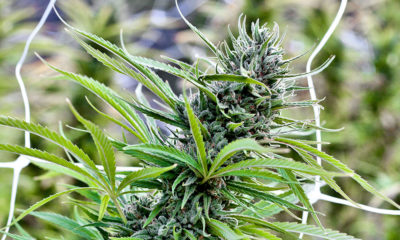Photo by Azel Praer
Barry Brautman, CEO of FoxBarry Farms and United Cannabis Corp., has made deal with the Pinoleville Pomo Nation to build a marijuana growing facility on their 99-acre Rancheria in Mendocino County. The management firm will be the first company to build a pot growing facility on tribal land.
Since inking the contract with Pinoleville Pomo to construct a $10 million facility that will operate with nearly 100 employees, over 100 tribes have contacted FoxBarry Farms curious about the marijuana industry.
“Tribes want what any government wants for its people, and that’s financial independence,” Brautman said. “They want to earn their own money, provide education, health care and housing. This new industry allows them to be more economically independent.”
Brautman is presently negotiating with other California-based tribes as well as organizations in seven states in hopes to add to two additional facilities planned in other parts of California.
Last year, the Department of Justice announced that tribes could grow and sell weed in accordance to federal guidelines defined for states that have legalized pot. Brautman anticipated this announcement and spoke with tribes about the marijuana industry. He understood that as states continued to legalize recreational and medical marijuana, Native American tribes would become increasingly aware of the industry’s economic impact.
“We did our research and found that the federal government defers to local jurisdictions on how they’re going to deal with marijuana,” he said. “By the definition of sovereign territories, tribal reservations are exactly the same as local jurisdictions.”
Even though a number of tribes in non-legal states have communicated with him, Brautman says that he only plans to do business with tribes that live in states that allow for medicinal or recreational pot usage.
“If an individual visits a reservation, purchases a product, then leaves, they’re now in possession of a controlled substance,” said Brautman. “Although [tribes] still have the ability to do this legally, I don’t think it makes sense from a business perspective.”
Many experts speculated that most of the 568 recognized Native American tribes would be hesitant to get into cannabis-based business. Ron Andrade, director of the Los Angeles City/County Native American Indian Commission cited the ambiguous language of federal government’s memo as a specific reason.
“It’s like the medical marijuana clinics here… Yeah, you can have one, but we’ll still arrest you” Andrade told LA Weekly, in reference to growing operations in California that are investigated by federal prosecutors.
Authorities were apprehensive about the project upon its introduction. Since then, Brautman has been in talks with Mendocino County lawmakers and the sheriff’s department, characterizing meetings as “positive.” He plans to meet with the area district attorney as well.
People against the plan argue that the size of the operation will end small-scale growing and pollute the environment. Brautman refuted that the “Wal-Mart effect” would be harmful to the area, as he plans to provide smaller growers the opportunity to sell their plants directly to his facility. He also has hired a regulator from the Environmental Protection Agency to work on site.
What do you think about Native American land being used for large scale marijuana growing? Will it affect tribes similarly to alcohol and gambling?

























